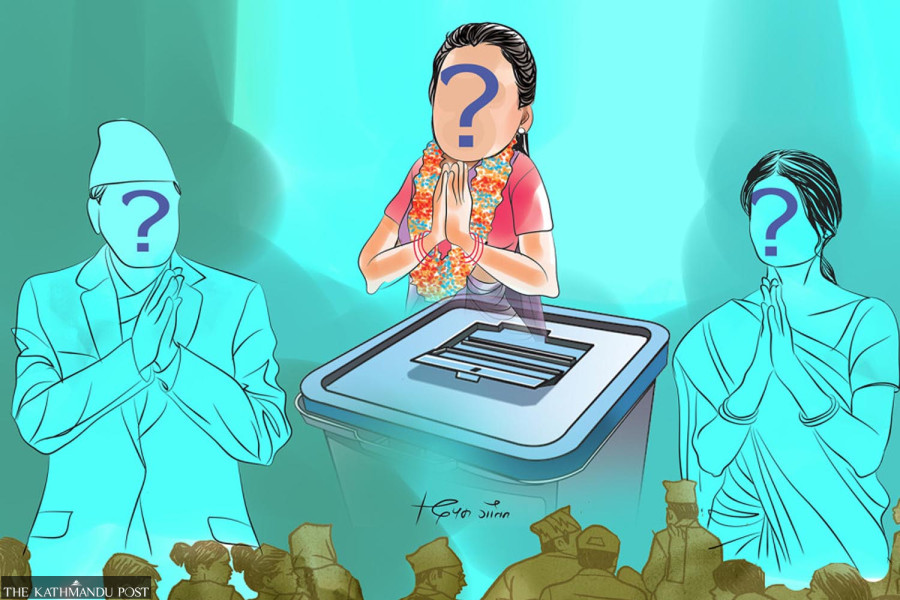Politics
Could the primary system work in Nepal?
After RSP, RPP is considering primaries to pick candidates.
Nishan Khatiwada
A common charge against Nepal’s political leadership is that they handpick party members and supporters as election candidates, political appointees and official nominees, thereby ignoring merit in awarding public positions.
Politicians thus amass power by building a coterie of supporters in party committees while transparency, a bedrock of democracy, takes a back seat.
Primary, the leadership selection process practised in Western nations such as the United States and the United Kingdom, is seen as a solution to this problem. The year-long primary before the US presidential election is watched the world over as top politicians battle each other. In the UK, after Boris Johnson announced his resignation last year, tough hustings were held in Scotland as to who between Liz Truss and Rishi Sunak weighed heavier.
In Nepal, such an exercise is normally absent while parties’ general conventions are largely predictable with limited leadership competition.
The Rastriya Swatantra Party (RSP) is believed to have introduced the primary system when the party, before the elections held in November last year, conducted polls to decide its potential candidates.
Lately, following in its footsteps, the Rastriya Prajatantra Party (RPP) has also decided to adopt a policy of picking its candidates through primaries. The party’s central committee meeting on Wednesday decided that 50 percent of the candidates under the direct and proportional systems in federal and provincial elections will be selected through primary elections.
RPP’s spokesperson Sagun Lawoti said the move is intended at making candidate-selection during elections more judicious, allow local cadres to select their own candidates and strengthen internal democracy. “The modality of conducting primary elections will be worked out soon,” Lawoti told the Post.
He added that the party is trying to move away from the traditional practices to new and more pragmatic methods. “The centre should allow the local committees to make required decisions on their own.”
Through primary elections, voters can express their preference for their party’s candidate, or a candidate in general, for an upcoming general election, local election, or by-elections.
The newly-formed RSP held the primaries to select candidates for the last major elections. Candidates for both the direct and proportional electoral categories were picked based on the primaries. However, for direct elections, some constituencies already had a candidate in mind, so there was no need to conduct primary elections.
“Voting was open for all members across Nepal who had verified their membership in the party’s application as we had a low number of members back then,” said Ganesh Karki, the party’s press coordinator.
Now, with the number of RSP members increasing, they are preparing a modality in which party members in their respective constituencies will vote to select candidates via primaries, say party leaders.
Conventional election practice has for long been blamed as unfair due to the misuse of money, muscle and power.
The new concept of primary elections brought by the political parties to select their election candidates is a commendable step, say observers.
Former Chief Election Commissioner Bhojraj Pokharel welcomed the RSP’s initiative.
As the central leaders handpick their candidates for the elections and practise nepotism and favouritism, rebellions and cross-votings have become common in Nepal’s polls. In addition, the parties also have been factionalised when leaders were denied tickets. According to Pokharel, if a party’s cadres select their own candidates, “such rebellions and cross-votings will be less likely”.
“At least there will be a competition. People will vote to select their candidates and the situation will be better than it is now,” said Nil Kantha Upreti, a former Chief Election Commissioner. “I have been continuously urging them to make the list of the proportional candidates based on the primary elections, but only if they are elected from the primaries held locally.”
Closed primary elections are more suitable to Nepal’s political system, experts say.
“The primary in which party members can vote to select candidates of their party in constituencies is more feasible,” said Upreti.
Karki said that open primaries are not viable in Nepal with its multi-party system. “Allowing people who feel close to multiple political parties to vote would increase the risk of corruption and manipulation.”
The primary elections have a few challenges though, say observers. Even the RSP’s primaries were not free from controversies. Party leaders were divided on the number of clusters from which to pick the proportional representation lawmakers—it had initially appeared to pick from among 12 clusters for proportional representation, separating open and women’s categories. But the RSP finally settled on six clusters, despite some leaders protesting that party leadership tried to influence candidates’ selection based on their interests.
During the primaries, there is a high chance of growth in the number of temporary voters who take party membership prior to the polls, just to vote for a candidate who can fulfil their vested interests. Experts emphasised the need to protect primary elections from undue impact of factors like money, muscle and castes.
“We need to make sure there is no vote-buying in these primaries,” said Pokharel.
According to Upreti, the big challenge will be deciding whom to give the task of conducting elections: the Election Commission, the political parties or someone else. Expenses could be another hurdle, as such elections could be costly affairs for political parties. “It would be tough for the political parties to implement the primary election system without making related laws,” Upreti says.
Online primaries could be an option.
The RSP’s press coordinator Karki said: “Conducting the primaries online is cost-effective, and less time- and effort-consuming.”
Another potential challenge, according to observers, is the potentially high number of willing contestants for primary elections. There can also be a monopoly of certain leaders at the constituency or the provincial level while selecting primary candidates.
To overcome this problem, Upreti added, “it would be helpful to set a cap on the number of candidates who can contest the primaries.”




 8.79°C Kathmandu
8.79°C Kathmandu














